COVID-19 and the most tumultuous election campaign in living memory created threats and opportunities for RMCs and traditional moving businesses in the US. But while the overall mood appears optimistic, the past year has left a lasting impact on the industry. Andrew Mourant reports
A pandemic out of control; a year of hostile electioneering; mob insurrection at the Capitol; and a state of emergency in Texas amid extreme winter weather – the US has never known such times. Businesses everywhere have battled to adapt and survive. Few sectors have jumped through more hoops than removals, which, above all, is about people and being on the go.
Across the States, FIDI Affiliates had to think on their feet even though the constraints of COVID-19 put many factors beyond their control. Their first priority was protecting staff and clients. Soon, every firm was operating in the world of masks, sanitisation, home-working and remote surveys. Yet for some, the changes proved less of a revolution than the hastening of a trend.
Sofia Marr is from Sullivan Moving & Storage, San Diego – whose non-Affiliated group HQ is in Seattle where the virus first emerged in the US. She says they were already primed for significant change, with majority owner Rick Smith having bought out minority partners in 2019. ‘We had to make dramatic changes very early,’ she says. ‘Employees and crews were instructed to stay home if they showed signs of being sick.’
Home-working dictated a swift technological upgrade for office staff, which looks to be here to stay. ‘We’ve no set plan requiring individuals to return to work in the office,’ says Marr. ‘But that conversation will change based on vaccine rollout in the coming months.’
At Boston-based Isaac’s Moving and Storage, half the office staff immediately began home-working, with the dispatch area redesigned to create a safer working environment. Extra warehouse personnel were taken on to sanitise equipment daily, and safety messages were driven home via a group messaging system.
Pittsburgh-based relocation management firm Aires moved all employees to remote-working within a fortnight. ‘Strong data protection programmes ensured we could protect customer and data systems while operating remotely,’ Quality Manager Laura May Carmack told FIDI Focus.
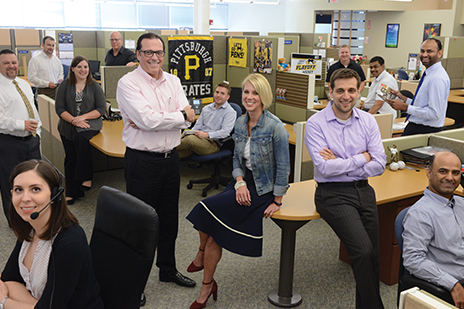
Clients were kept in the loop via a COVID-19 resource page containing regular shipping, immigration, and destination service updates. There was a drive to create virtual surveys, which have increased 40 per cent since March 2020.
With business travel growing more complex, Aires sought to get ahead of the game, conducting pre-trip assessments and preparing clients for whatever was needed on arrival in a new country. Its ‘safe landing’ service offers driver pick-up, wiping down luggage, and even grocery delivery.
Red-tape delays
Carmack adds that red tape has hampered things. ‘We’ve been subject to work stoppages, travel complications and government-imposed quarantines and restrictions. That’s delayed shipping and service delivery schedules. ‘There’s been an imbalance of shipping containers (over-supply of empty containers in some regions; a shortage in others), so we secured bookings well in advance.’
Aires entered the pandemic in ‘an enviable financial position’ after a record 2019. ‘We established a COVID-19 response team in February and were ready to move prior to initial shutdowns.’ That forward planning meant the firm could scale back on planned hiring and maintain staff without layoffs.
Steve Kuhn, CEO at Able Moving & Storage, based in Washington DC, says swift investment in ‘telecommuting technology’ quickly allowed his firm to minimise close contact among staff, and company owner Joe Singleton claims that driving home the safety message helped boost trade. ‘While many firms struggled to maintain business, we grew our commercial division by 30 per cent this year,’ he says.
Dividends from diversity
Michele Eckert, Able Moving & Storage’s Director of International, says diversity has helped the company thrive in tough times. Although international moves couldn’t get customs clearance, many national accounts have rescheduled moves for the middle of this year. ‘In anticipation, we’ve been able to staff up and train more employees,’ she says.
Kuhn is proud that Able has ridden the pandemic without having to let ‘a single employee go’. ‘The number of leaders that emerged during this hard time has been amazing,’ he says. ‘This will fuel growth as they’re promoted and make room for more hires.’
Tom Grohmann, Vice President of Movers International (MI), part of Weichert Workforce Mobility Service, witnessed a bumpy 2020, with moves dropping 23 per cent. Initially, MI struggled to obtain enough PPE, such was the demand. ‘We were forced to dig deep to find sufficient supplies,’ he says.
All administrative staff switched to home-working. ‘Luckily, we already had a work-from-home policy, allowing up to two days per week. Our IT systems and infrastructure were already in place and thoroughly tested.’ COVID-19 also hastened the firm’s planned switch to virtual surveys.
While Houston-based Roadrunner is familiar with a tough trading environment – from oilfield downturns to hurricanes – 2020 ‘was like no other’, says Senior Sales Consultant Phil Pollack. ‘But during lockdowns and social distancing, as many traditional revenue sources stuttered, we found new opportunities and were able to retain all staff.’
The firm quickly introduced an electrostatic spraying disinfection system to cleanse handling equipment, and has built up a niche trade disinfecting a variety of premises. ‘In future, many practices we have implemented will continue to benefit the health and safety of team members and clients,’ says Pollack.
Social distancing generated business from commercial offices and schools, such as reducing volumes of systems furniture and transporting the excess to Roadrunner’s storage facility. Some furniture ended up being recycled, or gifted to non-profit organisations.
A return to normal?
‘Texas has mostly returned to regular business activities,’ says Pollack. ‘However, central business districts and many high-density buildings aren’t yet operating as they were. But homes are selling well, and many households are moving from city to rural locations as people find options to work from home.’ Another new strand of business for Roadrunner has been transporting IT equipment from offices for home use.
The Biden administration will most likely grow areas of government Trump was trying to eliminate, so this will also create additional moving requirements
Businesswise, Q2 2020 saw CMS experience ‘a dramatic decline’ in its volume of domestic and international moves, with a top-line decrease of around 20 per cent. The shrinkage continued throughout the year, says Marr. ‘Many companies have continued to push back the start date of in-office work, which has severely impacted employees’ willingness to move until absolutely necessary.
‘With most large corporations working remotely, employees have seen this as an opportunity to save money. We’ve also seen a concerted shift from company-paid relocations to residential relocations, with lump sums provided by employers.’
Carmack tells FIDI Focus that Aires’ ‘broad mix of business and independence’ helped it weather the pandemic. ‘We saw decreases in volume, but – with a diverse mix of customers – increases in some segments. Others remained flat. We weren’t unscathed by 2020, but feel fortunate looking into 2021.’
The hardest hit
Grohmann admits that COVID had a negative impact on Movers International’s household goods business and its mobility services division. Peak declines were felt in April and May, and despite some improvement in summer and beyond, jobs were cut. However, MI is just one part of the Weichert group, which has 18 companies. ‘Other businesses experienced record levels of activity, such as our real estate, insurance, mortgage and title sectors,’ he adds.
For Isaac’s, COVID’s impact on all business sectors was ‘immediate and powerful,’ says owner Isaac Edry. ‘But once the initial shutdown was lifted, we were able to recover sufficient volumes of local, interstate and international moves.
‘There was a longer pause in international as countries developed rules and regulations regarding imports and exports, but once these were established, a sense of regularity returned.’
Corporate moves were hardest hit, with most companies drastically reducing their relocations. At the same time, military moves, which had been frozen for three months, opened up, and Isaac’s seized the opportunity. ‘This influx of business allowed us to compensate for some of the corporate decline,’ says Edry.
Isaac’s examined its overheads, saving money wherever possible. It renegotiated pricing with vendors and pruned operating costs. Despite COVID-forced restructuring, the company also created jobs to help overcome various challenges.
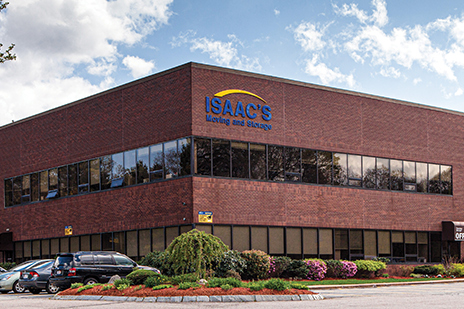
Military shake-up
One potential source of new business for FIDI Affiliates will be changes to the US Department of Defense military moving contract. Although meant to have been awarded in 2020, these have, as FIDI Focus previously reported, been pushed back to June 2021.
The contract will be awarded to a single business, with the winner offering large sub-contracts for other providers. The new system is designed to reduce delayed moves and damage to military personnel goods, two long-standing problems.
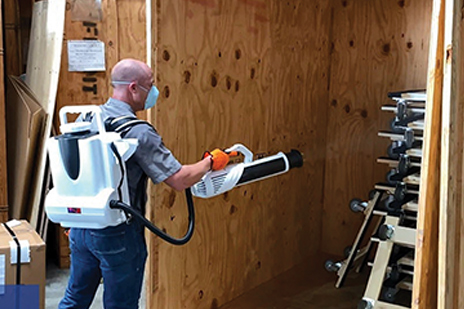
Kuhn welcomes the change. ‘While Able has never done much military work, we’ll probably start doing some now,’ he said. ‘The small group of movers that dominated the military landscape probably suffocated the quality of services.’
Isaac’s is ‘anxiously awaiting’ details of the new arrangement, while Marr sees the change as ‘a huge opportunity for the moving industry to take a leap forward with new solutions’. ‘The military sacrifice their lives to protect and serve America and deserve to be treated with care and respect,’ she said.
Election fallout
With the dust settling from a turbulent election campaign, FIDI Affiliates have been weighing up the prospects for future business. ‘The work Able does for the State Department will certainly increase,’ says Eckert. ‘A change in party power will result in a large amount of regional turnover requiring our services.
‘The [Joe] Biden administration will most likely grow areas of government Trump was trying to eliminate, so this will also create additional moving requirements.’
Pre-election turmoil created an unexpected business opening for Able, adds Singleton. ‘During protests throughout the year, property was frequently defaced and damaged in Washington DC. The Chamber of Commerce asked us to help dismantle some of this and safeguard it for the future.’
In Edry’s view, political uncertainty energised the real estate market. ‘We experienced an influx of metropolitan moves to less-densely populated areas,’ he said. ‘I’m confident the moving business will make a comeback, but there’ll be lasting effects and changes, such as remote-working, increased volume, quality of the virtual survey, and safety measures for moving staff.’
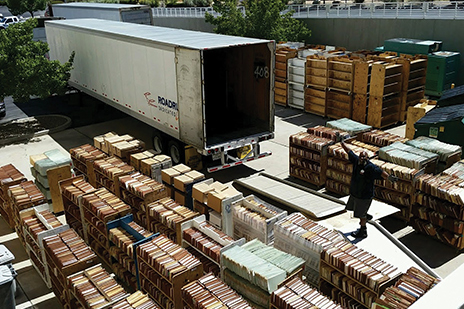
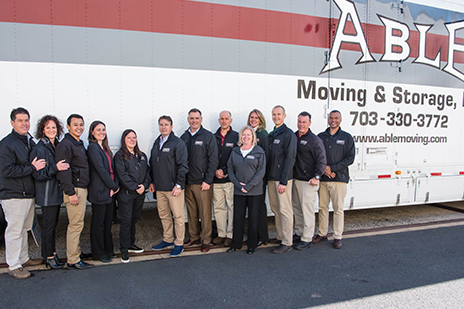
The corporate market, he believes, may be slow to bounce back. ‘We’re continuing to invest energy and resources into growing private and office and industrial moving sectors, to compensate.’
Marr says that CMS welcomes ‘the predictability’ she expects to accompany Biden’s administration. ‘With the very narrow majority, we believe the swing of policies won’t be as dramatic as previously anticipated,’ she adds.
‘The potential for fiscal stimulus could result in a more robust economic recovery once vaccines are readily available and lockdowns in the rear-view mirror. A low interest-rate environment and continued strength of the single-family housing market will help bolster our industry.’
Pollack is sanguine about the impact of political change on Roadrunner’s prospects. ‘Typically, whenever there are changes, business and people seem to find reason to move and store inventory. We’re hopeful looking towards the future.’
Grohmann, too, is ‘fairly optimistic’ that the overall economy, and with it moving, will recover. ‘But it may take longer than most expect – I cannot help but feel that there’ll be a longer-term reduction in short-term assignments.’
Corporations will have grown used to virtual-meeting technology, and the savings made by ‘massively reduced’ travel expenses. ‘A certain “baked-in” effect takes place after a period of time,’ he says.
‘Lasting changes must include an increased level of awareness of health and disease spread. I feel that taking temperature checks upon our crews’ arrivals each morning will become a norm, even after the pandemic.’


